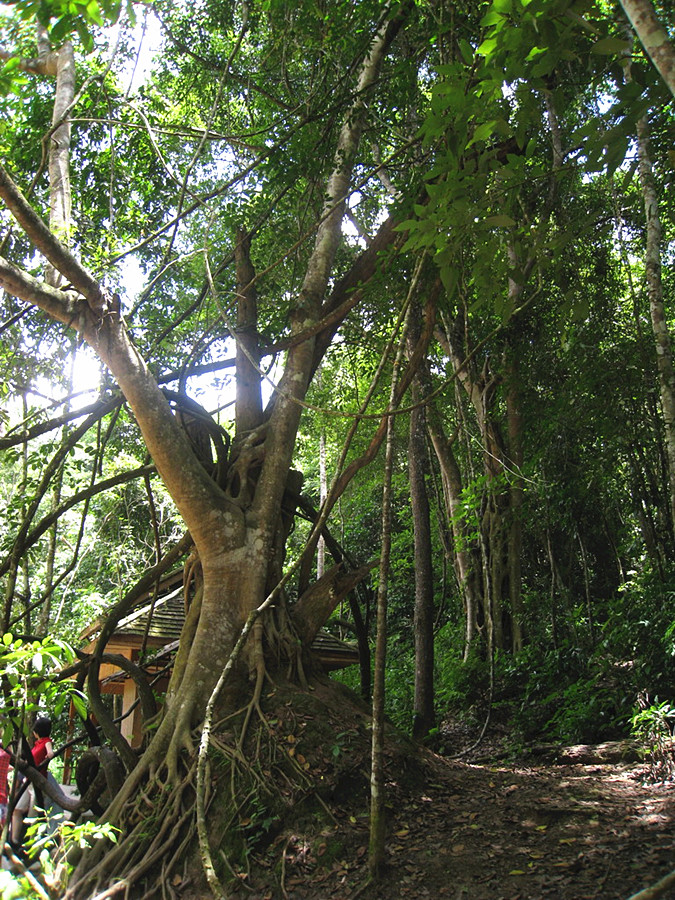
King of the Ancient Tea Trees in Menghai County, XishuangBanna
Chinese Name:西双版纳勐海县古茶王
The King of the Ancient Tea Tree in Menghai County, Xishuangbanna refers to a collection of prestigious and ancient tea trees that are highly regarded in the world of Pu’er tea. These tea trees are symbols of the rich cultural heritage and historical legacy of tea cultivation in this region. The “Ancient Tea Kings” are revered not only for their impressive age but also for the quality of the tea they produce, which is prized for its unique flavor, aroma, and health benefits. Below are the most famous of these ancient tea trees:
1. Nannuo Mountain Tea King (南糯山茶王)
- Location: Nannuo Mountain, Menghai County
- Significance: Nannuo Mountain is home to ancient tea trees that are over 800 years old. The tea from these trees is known for its smooth and mellow flavor, offering a distinctive sweetness that develops from the unique growing conditions on the mountain. Nannuo Mountain holds a special place in Xishuangbanna’s tea culture, as it has been a significant tea-producing area for centuries. The tea trees here are meticulously cared for by local communities, maintaining their ancient legacy.
- Tea Profile: Nannuo Mountain Pu’er tea is noted for its floral fragrance, light bitterness, and lingering sweetness, making it popular among Pu’er tea enthusiasts.
2. Lao Banzhang Tea King (老班章茶王)
- Location: Lao Banzhang Village, Menghai County
- Significance: Lao Banzhang is considered the “Holy Grail” of Pu’er tea due to its ancient tea trees, some of which are over 1,000 years old. The tea from this region is renowned for its bold and powerful flavor, often described as having a strong chaqi (茶气, tea energy). Lao Banzhang Pu’er is highly coveted by tea collectors and connoisseurs for its robust taste and complex aromatic profile, including a perfect balance of bitterness and sweetness.
- Tea Profile: Lao Banzhang Pu’er tea is characterized by its thick texture, bitterness that quickly transforms into sweetness, and an enduring aftertaste. It is often described as powerful, with a strong kick of chaqi that is cherished by Pu’er enthusiasts.
3. Bada Mountain Tea King (巴达山茶王)
- Location: Bada Mountain, Menghai County
- Significance: Bada Mountain is famous for having some of the oldest wild tea trees in the world, with trees that are over 1,700 years old. The tea from Bada Mountain is known for its deep, rich flavors, and is considered one of the most historically significant varieties of Pu’er tea. These ancient wild tea trees are believed to represent the original tea species, giving the tea a natural and distinctive character.
- Tea Profile: Bada Mountain Pu’er tea is appreciated for its mellow, earthy flavors, rich mouthfeel, and long-lasting sweetness. Its complexity develops over multiple brews, offering a rich tea-drinking experience that embodies the essence of ancient Pu’er tea traditions.
The Cultural and Historical Importance of “Ancient Tea Kings”
The “Ancient Tea Kings” of Menghai County are more than just sources of high-quality tea; they are living monuments of the region’s cultural history. The trees have been passed down through generations of Dai and Bulang ethnic groups, who have cultivated and protected them for centuries. These trees are considered sacred in the local communities, representing the harmony between humans and nature, as well as the cultural heritage of the Pu’er tea trade, which has been flourishing in Yunnan for over a thousand years.
In addition to their cultural significance, these ancient tea trees play an essential role in the Pu’er tea industry, which is one of the most valuable tea markets globally. Tea from these “Ancient Tea Kings” often fetches high prices due to its scarcity, quality, and historical value, making it a prized possession for tea collectors and aficionados around the world.
Visiting the “Ancient Tea Kings”
Travelers and tea enthusiasts visiting Menghai County have the opportunity to explore these ancient tea forests, experience the rich tea culture, and even participate in tea-picking and tasting activities. The surrounding villages, like Lao Banzhang and Nannuo, offer a unique opportunity to learn about traditional tea cultivation methods, connect with the local communities, and appreciate the deep-rooted relationship between the land, the tea trees, and the people who have nurtured them for generations.


 7 Days GolfingTour
7 Days GolfingTour
 8 Days Group Tour
8 Days Group Tour
 8 Days Yunnan Tour
8 Days Yunnan Tour
 7 Days Shangri La Hiking
7 Days Shangri La Hiking
 11 Days Yunnan Tour
11 Days Yunnan Tour
 6 Days Yuanyang Terraces
6 Days Yuanyang Terraces
 11 Days Yunnan Tour
11 Days Yunnan Tour
 8 Days South Yunnan
8 Days South Yunnan
 7 Days Tea Tour
7 Days Tea Tour
 8 Days Muslim Tour
8 Days Muslim Tour
 12 Days Self-Driving
12 Days Self-Driving
 4 Days Haba Climbing
4 Days Haba Climbing
 Tiger Leaping Gorge
Tiger Leaping Gorge
 Stone Forest
Stone Forest
 Yunnan-Tibet
Yunnan-Tibet
 Hani Rice Terraces
Hani Rice Terraces
 Kunming
Kunming
 Lijiang
Lijiang
 Shangri-la
Shangri-la
 Dali
Dali
 XishuangBanna
XishuangBanna
 Honghe
Honghe
 Kunming
Kunming
 Lijiang
Lijiang
 Shangri-la
Shangri-la
 Yuanyang Rice Terraces
Yuanyang Rice Terraces
 Nujiang
Nujiang
 XishuangBanna
XishuangBanna
 Spring City Golf
Spring City Golf
 Snow Mountain Golf
Snow Mountain Golf
 Stone Mountain Golf
Stone Mountain Golf



















